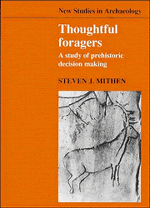Book contents
- Frontmatter
- Contents
- List of figures
- List of tables
- Preface
- 1 Introduction
- PART ONE LEARNING FROM THE PRESENT
- 2 The eco-psychology of decision making
- 3 The ethnography of hunter-gatherer decision making
- PART TWO MESOLITHIC FORAGING AND SOCIETY
- PART THREE UPPER PALAEOLITHIC ART AND ECONOMY
- Bibliography
- Index
2 - The eco-psychology of decision making
Published online by Cambridge University Press: 04 August 2010
- Frontmatter
- Contents
- List of figures
- List of tables
- Preface
- 1 Introduction
- PART ONE LEARNING FROM THE PRESENT
- 2 The eco-psychology of decision making
- 3 The ethnography of hunter-gatherer decision making
- PART TWO MESOLITHIC FORAGING AND SOCIETY
- PART THREE UPPER PALAEOLITHIC ART AND ECONOMY
- Bibliography
- Index
Summary
The more global…a cognitive process is,
the less anybody understands it.
Fodor's first law of the non-existence of cognitive science, 1983: 107The whole thinking process is still rather mysterious to us, but I believe that the attempt to make a thinking machine will help us greatly in finding out how we think ourselves.
Alan Turing (quoted in Hodges 1983: 442)We are all experts at decision making. After all, we have been practising the art for most, perhaps all, of our lives. Each of us knows that some decisions are easy to make and some difficult, and also that sometimes we have made the right and sometimes the wrong choice. Occasionally we reflect upon a decision and how we arrived at a particular choice. Most often this occurs when we appear to have been foolish. Why ever did I choose to become an archaeologist? What made me choose to study decision making? Why on earth did I decide to write/read this book? When doing this, we tend to take the decision process apart and look at the information we had available to us, what now appears to have been missing and how we thought that some items carried more weight than others. Often we remain uncertain as to why we made a particular choice. Why did I decide to be an archaeologist? Well, perhaps because I thought that seeking after the roots of human culture would be intellectually fulfilling. Alternatively it may have been the thought of digging for buried treasure in the sun with endless supplies of wine and good food.
- Type
- Chapter
- Information
- Thoughtful ForagersA Study of Prehistoric Decision Making, pp. 21 - 51Publisher: Cambridge University PressPrint publication year: 1990

